- Home
- Victor Hugo
The Last Day of a Condemned Man Page 7
The Last Day of a Condemned Man Read online
Page 7
A large tub was brought into the yard. The keeper stopped the dance with his baton, and led the convicts to this tub, in which some herbs were floating in a dirty, smoky, liquid. They began to eat.
When they had finished, they threw upon the pavement what was left of their soup and brown bread, and began to dance and sing again. It seems that this privilege is allowed them on this day and the following night.
I was watching the strange sight with such a hungry, trembling, close attention, that I had forgotten myself. A great pity filled me, and their laughter made me weep.
Suddenly, in the midst of my deep revery I saw the shouting circle stop and grow silent. Then every eye turned toward my window.
"The condemned man! The condemned man!" they cried, shaking their fingers; and the bursts of laughter increased.
I stood petrified.
I had no idea where they had seen me before or how they recognized me.
"Good-morning! Good-evening!" they cried, with their horrible chuckle. One of the youngest who was condemned to the galleys gave me a dull look of envy, and exclaimed: "He is happy! He will be cut off! (beheaded!) Farewell, comrade!"
I cannot describe my feelings. I was their comrade, in truth. La Greve is sister to Toulon. I was even on a lower level than they; they did me an honor. I shivered.
Yes, their comrade! And in a few days I, too, might be an amusing sight for them.
I was standing at the window, immovable, petrified, paralyzed; but when I saw the five cordons rush toward me with words of infernal good-fellowship, when I heard the frightful clanking of their chains, their shouts, their steps at the foot of the wall, it seemed as though this crowd of demons were climbing into my wretched cell. I gave a shriek, and hurled myself against the door with force enough to break it. No means of escape; the locks were drawn on the outside. I yelled, I shouted in fury. Then I seemed to hear the convicts' fearful voices coming nearer. I thought that their hideous faces were already at my window; I gave a second agonizing cry, and fell senseless to the floor.
Chapter XIV
When I recovered consciousness it was night. I was on a pallet; a lantern threw a flickering light on the ceiling, and I saw rows of other pallets on both sides of mine. I knew that I was in the hospital. For a moment I lay awake, but without thinking of anything, entirely given up to the joy of being in a bed. Once, this hospital and prison-cot would have made me shudder in disgust and pity; but I was no longer the same man. To be sure, the sheets were soiled and coarse to the touch, and the covering thin and ragged. I felt the boards beneath the mattress; but what of that? My limbs could stretch out between the rough sheets; and beneath the covering, thin as it was, I felt that horrible cold in my bones slowly beginning to disappear. I fell asleep again.
I was awakened by a great uproar; it was daybreak. The noise came from without. My bed was by the side of a window, and I rose to see what was happening.
The window looked out upon the great court of Bicetre, which was filled with people; two lines of veterans had all they could do to make a narrow path across the court in the midst of the crowd.
Between this double line of soldiers, five long wagons full of men were jogging slowly along, jostling over each stone. They were the convicts who were leaving.
The wagons were uncovered. Each cordon occupied one. The convicts were seated sidewise on the benches, one leaning against the other, separated by their common chain, which lay along the entire length of the wagon, at the end of which stood a keeper, gun in hand. The clanking of the irons could be heard; and at every shake of the wagon, their heads were jerked forward and their dangling legs shook.
A fine, thin rain was falling, making the air frigid, and causing their gray linen trousers, which were already black, to cling to their knees. The rain poured from their long beards and short hair, their faces were purple; they were shivering, and their teeth chattered with rage and cold. More than this, they could not move. Once riveted within the chain, one is no longer anything but a part of that hideous cordon which moves like one man. The intellect leaves one; the prison-collar condemns it to death; and as to the being himself, he has no longer desires and an appetite except at fixed hours. So, motionless, the most of them half-naked, with bare heads and dangling feet, they began their journey of twenty-five days, seated in the same wagons, and dressed in the same clothes under the perpendicular sun of July as in the cold rains of November. One might say that in their office of hangmen, men wish the climate to do half.
Some sort of a horrible harangue arose between the people and those in the wagons,--abuse on the one side, bravado on the other, curses on both; but at a sign from the captain, I saw blows raining from the baton upon the wagons, on shoulders and heads alike, and everything assumed that exterior calm called order. But the wretches' eyes were full of vengeance, and their fists were clinched on their knees.
The five wagons, guarded by mounted gendarmes and keepers on foot, disappeared one after another beneath the high arched gate of Bicetre; a sixth followed, in which the kettles, brass porringers, and extra chains rattled together in noisy confusion. Some keepers who had been detained at the canteen ran out to catch up with their squad. The crowd began to scatter. The picture vanished like a phantasmagoria. By degrees, the heavy rolling of the wheels and the tramp of the horses' hoofs on the paved road from Fontainebleau grew faint, and the crack of the whips, the clank of the chains, and the cries of the people wishing the galleys an unlucky journey, died away.
But for them it was only the beginning!
What was it the lawyer said to me? The galleys! Ah, yes! death a thousand times,--the scaffold rather than the galleys; nothing rather than hell. I would give my neck to the knife of the guillotine, but not to the prison-collar! The galleys, just Heaven!
Chapter XV
Unfortunately I was not ill, and the next day I had to leave the hospital and return to my cell.
Not ill! Ah no, I am young, strong, and healthy. The blood runs freely in my veins; my every member answers my every fancy. I am strong in mind and body, I was made to live long; yes, this is all true, and yet I have a malady,--a mortal malady, a malady made by the hand of man.
Since I came from the hospital, the idea has come to me to become mad; perhaps I might escape if I could do this. The doctors and the Sisters of Charity seemed to be interested in me. To die so young, and such a death! One would have thought they were sorry for me, they gathered so close about my pallet. Bah! it was from curiosity. And then, these people who help you, cure you of a fever, but not of a death-sentence. Yet that would be so easy for them. An open door! What would it matter to them?
I have no chance now; my appeal will be rejected because everything is correct. The witnesses testified clearly; the plaintiffs have pleaded well; the judges have sentenced. I do not expect--but--no; what folly! There is no more hope. The appeal is a rope which holds you suspended above an abyss, and which creaks every moment until it breaks. It is as if the knife of the guillotine took six weeks to fall.
Suppose I were pardoned?--Pardoned! And by whom? And why? And how? It is not possible for them to pardon me. It is for an example, as they say.
Only three steps remain for me,--Bicetre, the Conciergerie, La Greve.
Chapter XVI
During the few hours that I spent in the hospital I sat near a window in the sunshine,--it had come out again,--or at least in as much of it as could creep in through the grating.
I sat there, with my heavy head in my hands, which was more than they could hold, my elbows on my knees, and my feet on the rounds of my chair, for I am so weak that I lean over as though I no longer had either bones in my limbs or muscles in my flesh.
The close air of the prison was worse than ever; my ears still rang with the noise of the galleys' chains, and I was growing very tired of Bicetre. It seemed to me that God ought to pity me, that he might at least send me a little bird to sing to me from the edge of the opposite roof.
I do not know whether
it was God or the Devil who answered my wish, but almost at that very moment I heard a voice beneath my window; not that of a bird, but, what was better, the pure, fresh, clear voice of a young girl of fifteen. I raised my head with a start, and listened greedily to the song she sung. The air was slow and languishing, a kind of sad and lamentable cooing. The words were something like these:--
"It was in the Rue du Mail
I was caught, oh, sorry tale!
Wretched I!
By three gendarmes, cruel men,
Who came rushing at me when
I passed by."
I cannot tell you how bitter was my disappointment. The voice sang on:--
"They came rushing at me, so!
Put great handcuffs on me, oh!
Such a load.
Then arrived the police-spy,
And a robber-friend came by
On the road,
A friend both quick and rife [nimble].
And I cried: 'Go tell my wife I am caught!'
Then my wife came with a run,
'Husband, tell me, what hast done?'
(Thus she fought.)
Thus my wife in rage began,
And I said: 'I've killed a man Oh, my dear!
His gold watch and money too,
And his rings so bright and new, I have here!
'Yes, his rings so new and bright!'
My poor wife set out that night For Versailles;
A petition she did bring
For my pardon; begged the king,
With a cry!
Sought the king to plead my cause.
And had I escaped the laws, Wretched I,
I would deck my wife, I say,
In rich silks, and ribbons gay I would buy.
Slippers, too, I'd have her wear;
But the king in wrath did swear: 'By my crown!
I will make him dance a dance
O'er a floorless, broad expanse, Dangling down!"
I could hear no more, nor did I wish to. The half-veiled meaning of the horrible complaint; the struggle of the brigand with the sentinel; the robber he meets and sends to his wife with the horrible message: "I have killed a man, and have been arrested," "I have made an oak-tree sweat, and I am caught;" the woman running to Versailles with a petition, and his Majesty growing indignant and threatening the accused to make him dance the dance where there is no floor,--all this sung to the sweetest tune in the sweetest voice human ear ever heard! I was amazed, petrified, completely broken down. It was so dreadful that all these terrible words should come from such fresh and rosy lips. It was like drivel from a slug on a rose.
I cannot describe my feelings; I was both ashamed and sorry. The patois of the prison and the galleys, such strange and bloody language, such hideous slang, sung by a young girl, in a voice that was a graceful combination of a child's and a woman's! All these deformed, shapeless words sung with such delicacy and rhythm.
Ah, what an infamous place a prison is! There is a poison about it which spoils everything. Everything is tarnished by it, even the song of a young girl of fifteen. You find a bird there; it has mud on its wing: you gather a pretty flower, you smell it; its odor is offensive.
Chapter XVII
Oh, if I could only escape, how I would run!
But no, one should not run. That would rouse suspicion. One should walk slowly, and sing, with head erect. If possible, one should wear an old blue smock-frock with red figures on it. That would be a good disguise. Every gardener in the neighborhood wears one.
I know a thicket near Arcueil, by the side of a swamp, where I used to come with the fellows every Thursday when I was at college, to fish for frogs. I would hide there until evening.
When night came I would go on again. I would go to Vincennes. No; the river would prevent me. I would go to Arpajon. It might be better to go by Saint-Germain, to Havre, and embark for England.
Well, in any case, I would finally reach Longjumeau. A gendarme passes me. He asks for my passport. I am lost!
Ah, poor dreamer! first break the three feet of thick wall which holds you a prisoner! Death! Death!
And to think that once when I was a child I came here to Bicetre, to see the great dungeons and the madmen!
Chapter XVIII
While I have been writing all this, my lamp has grown dim, daylight has come, the chapel clock has struck six--
What does that mean? My keeper has just been into my cell; he took off his cap, bowed to me, apologized for disturbing me, and asked me in as mild a tone as his tough voice could command, what I wanted for breakfast.
I began to shiver. Will it happen to-day?
Chapter XIX
Yes, it is going to happen to-day!
The director of the prison came himself to see me. He asked me what he could do for me. He hoped I had nothing to complain of, either in regard to him or his subordinates; asked with interest about my health, and how I had passed the night. As he was leaving, he called me sir!
It is to happen to-day!
Chapter XX
This jailer thinks I have no complaint to make of him or his subordinates, and he is right. It would be wrong indeed of me to complain; they have done their duty in guarding me carefully; and they have been polite at all times. Should I not be content?
This good jailer, with his gentle smile and kind words, his eye which flatters and at the same time spies, his great thick hands,--he is the prison incarnate; he is Bicetre personified. Everything is a prison about me. I find it in every form; under the human form as under that of lock and key. This wall is the prison in stone; this door is the prison in wood; the keepers are prisons in flesh and bone. The prison is a horrible being, complete, indivisible,--half-house, half-man. I am its prey: it broods over me; it holds me in its close embrace; it encloses me within its granite walls, clasps me beneath its iron bolts, and watches me with its jailer's eyes.
Ah, wretch that I am! what shall I become? What do they want to do with me?
Chapter XXI
I am calm now. All is well over. I have recovered from the horrible anxiety which the director's visit gave me. For, I will confess, I did have hope. Now, thank God, I have none.
This is what has just taken place:--
Just as the clock struck half-past six--no, a quarter-past--my prison door opened. An old man with white hair, in a long brown cloak, entered. His cloak was thrown back, and I saw a cassock and a band. He was a priest.
But he was not the prison chaplain, and this did not augur well.
He sat down opposite me, and smiled kindly; then he bowed his head, and raised his eyes to heaven,--that is, to the ceiling of my cell. I understood what he meant.
"My son," said he, "are you prepared?"
I answered in a weak voice,--
"I am not prepared, but I am ready."
A mist rose before my eyes, an icy perspiration came out all over me; I felt my temples swelling and my ears ringing.
While I swayed in my chair as though half asleep, the good man talked to me.
At least, I think he did; I seem to remember that his lips moved; and, while his hands clasped each other, his eyes lighted up.
The door opened a second time. The grating of the key roused me from my stupor and him from his discourse. A gentleman in black, accompanied by the director of the prison, appeared, and bowed low to me. The man wore on his face that sad official look which belongs to undertakers. He held a roll of paper in his hand.
"Monsieur," he said with a courteous smile, "I am the bailiff from the royal court-house of Paris. I have the honor to bring you a message from the attorney-general."
The first shock over, all my presence of mind returned.
"Is it the attorney-general," I asked, "who demands my head? I feel highly honored that he has written to me. I trust that my death will give him much pleasure; for it would be hard to think that he asked for it so anxiously, and that after all it was indifferent to him."
I said all this, and continued in a
firm voice,--
"Read it, sir."
He began to read a long document, chanting at the end of every line, and hesitating between each word. It was the refusal of my appeal.
"The sentence will be carried out to-day, on the Place de Greve," he added, when he had finished, and without raising his eyes from the paper. "We leave at exactly half-past seven for the Conciergerie. My dear sir, will you be good enough to be ready?"
I had heard nothing for a moment or two. The director was talking with the priest, who was gazing at the paper. I glanced toward the half-open door. Ah, miserable fool! four soldiers stood in the corridor!
The bailiff repeated his question, this time looking at me.
"Whenever you please," I replied. "You may make your self easy." He bowed, saying,--
"I shall have the honor of returning for you in half an hour."
Then they left me alone.
O God! some means of escape! some means; I know not what! I must escape! I must! And at once! By the door, the window, through the timbers of the roof! Even though I leave my skin on the beams!
Oh, fury! demons! malediction! It would take mouths to pierce through the walls with the best of instruments, and I have not even a nail or an hour!
Chapter XXII
In the Conciergerie
HERE I AM TRANSFERRED, AS THE REPORT SAYS.
But the journey is worth describing.
The clock was striking half-past seven as the bailiff again presented himself at the door of my cell. "Monsieur," said he, "I am ready for you." Alas! he and others as well!

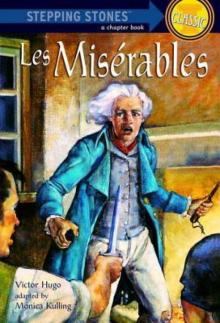 Les Miserables
Les Miserables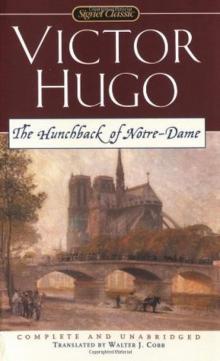 The Hunchback of Notre-Dame
The Hunchback of Notre-Dame The Man Who Laughs
The Man Who Laughs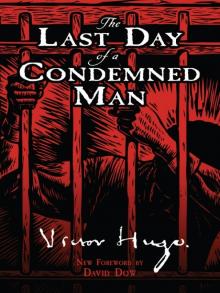 The Last Day of a Condemned Man
The Last Day of a Condemned Man The Toilers of the Sea
The Toilers of the Sea Waterloo
Waterloo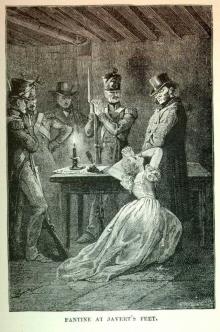 Les Misérables, v. 1/5: Fantine
Les Misérables, v. 1/5: Fantine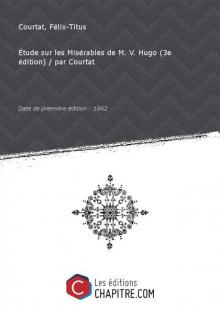 Les Misérables, v. 3/5: Marius
Les Misérables, v. 3/5: Marius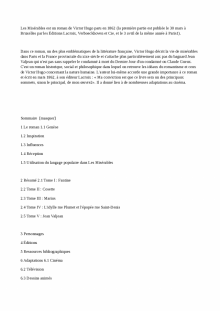 Les Misérables, v. 2/5: Cosette
Les Misérables, v. 2/5: Cosette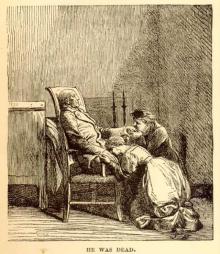 Les Misérables, v. 5/5: Jean Valjean
Les Misérables, v. 5/5: Jean Valjean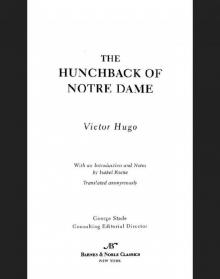 Hunchback of Notre Dame (Barnes & Noble Classics Series)
Hunchback of Notre Dame (Barnes & Noble Classics Series) Les Miserables (abridged) (Barnes & Noble Classics Series)
Les Miserables (abridged) (Barnes & Noble Classics Series)